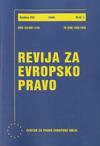EVROPSKA UNIJA I ELEKTRONSKO PRAVO
EUROPEAN UNION AND ELECTRONIC LAW
On Occasion of the Community Directive of Electronic Signatures
Author(s): Jelena VilusSubject(s): Law, Constitution, Jurisprudence, EU-Legislation
Published by: Удружење за европско право - Центар за право Европске уније
Keywords: electronic commerce; digital and electronic signatures; authentication of signatures by certification authorities; encryption of signature; the role of public and private keys; mistakes; frauds;
Summary/Abstract: The purpose of the adoption of the Community Directive of electronic signatures, adopted at the end of 1999 was to equalize the legal effect of electronic (digital) signatures with personal ones. To achieve this, it was necessary to adopt regulations (mostly based on the Model Act of UNCITRAL on electronic trade, of 1999) on foundation, work, and responsibility of certification bodies. According to the Directive, certification bodies can be legal or physical persons which fulfil quite rigorous conditions, placed in the Appendix I, which is quoted as an integral part of the Directive. The second important reason for the adoption of the Directive is to confirm and stimulate development of contemporary electronic technologies and to ensure the equality of all citizens and inhabitants of the Community no matter in which state they live, thus providing the unity of European market. The regulation quoted at the end of the Directive about the obligation of the Commission to follow the development of electronic technologies and the need for harmonization, i. e. the revision of regulations, is certainly of great importance. This intonation is decidedly formulated in the Article 1 of the Directive, where it is said that "the aim of the Directive is to make easier the use of electronic signatures and to contribute to their legal recognition". Further it is added that in the way "the legal frame for electronic signatures and certain services of certificate issuing, in order to secure the internal market, has been made." By the analyses of this Directive, it can be concluded that certain basic questions are regulated by it, basic question that are of importance for electronic signatures, and that a large part of regulations that would enable successful functioning of the Directive, is left to the discretion of the Member States.
Journal: Revija za evropsko pravo
- Issue Year: 2/2000
- Issue No: 1
- Page Range: 49-67
- Page Count: 19
- Language: Serbian

